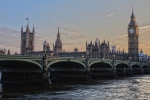
For the latest medical advice, visit NHS.uk/Coronavirus.
I entirely understand people's concerns around the Coronavirus and naturally many people are worried – this is a rapidly developing situation and the Government’s advice at all times is being dictated by scientific advice and expert guidance. I hope these pages will provide useful information, if you need any help or advice that is not covered on these pages, please get in touch using the 'Contact' button at the top of this page.
NHS Covid-19 App
The government is encouraging people to download the NHS COVID-19 app which is a central part of NHS Test and Trace by contract tracing through low-energy Bluetooth, alerting users to transmission levels in their area, logging your test results, helping people check into venues and providing a symptom checker.
It is available for those over the age of 16, and will track your distance and time spent with other app users to alert you if someone you have been in close contact with tests positive for COVID-19.
The app user’s personal information and data will remain secure, as none of it is provided to the government or NHS. It does not hold personal information, and only requires the first half of your postcode to show local transmission rates. Frequent, random unique IDs are also regenerated for extra security.
Coronavirus Information Service
The UK Government has launched a GOV.UK Coronavirus Information service on WhatsApp.To use the free GOV.UK Coronavirus Information Service on WhatsApp, simply add 07860 064422 in your phone contacts and then message the word ‘hi’ in a WhatsApp message to get started.
How serious is COVID-19?
The evidence shows us that the vast majority of people who get this virus have relatively mild symptoms and make a full recovery. But in a small percentage of cases, the virus can cause more severe symptoms. This is particularly true for people with a weakened immune system, for older people and for those with long term conditions like diabetes, cancer and chronic lung disease.
A lot of false information about this virus is being shared - it’s very important that you make sure that the information you use comes from a trusted source - all of the information on this page has been sourced from the NHS.
What are the symptoms?
If you are infected you may have very minor symptoms, minor symptoms or more severe symptoms, but the NHS cites three symptoms to look out for as:
- A new continuous cough
- A fever or high temperature
- A loss or change to your sense of smell or taste
As your local MP, I am here to support our health services, individuals and businesses in any way I can who are affected by coronavirus. However, please understand that I have limited staff, and they are working to help in whatever way they can. If you need any help or advice, please get in touch using the 'Contact' button at the top of this page.




